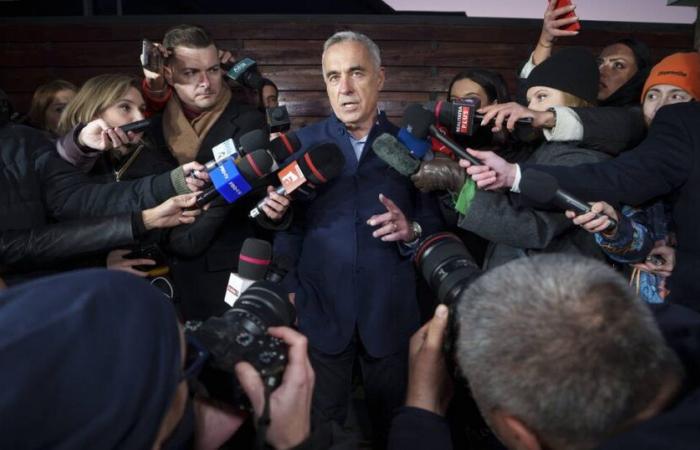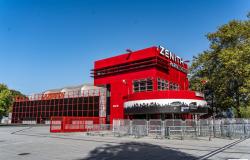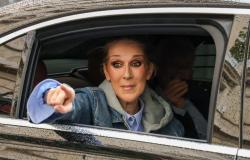The Romanian Orthodox church of La Courneuve (Seine-Saint-Denis) is hidden in a building with tinted windows, at the end of a street which winds between a recycling center and the RER B rails. to the families in embroidered shirts and colorful kerchiefs who come out at the end of Sunday mass. The interior, with its golden frescoes and marble floors, is as dazzling as the exterior is anonymous. “Our church is the image of what a good Christian should do. Cultivate your soul rather than your appearance,” explains Andrei, the priest's well-dressed son, with a smile.
The parish created twelve years ago has grown to the rhythm of the Romanian community in the Paris suburbs. Every week, several hundred people attend the service. “It’s a place that allows us to come together, to talk about the country. At the moment, of course, there is a lot of talk about politics after mass. Everyone wants to come back to Romania one dayso we continue to be very interested in it,” says a parishioner.
In the electoral upheaval that Romania has been experiencing since November 24, the diaspora plays an important role. In the first round of the presidential election, voters from abroad, who have never been so numerous at the polls, placed Calin Georgescu, a virtually unknown admirer of the fascists of the interwar period, in lead with 43%. That is almost double his score in Romania itself, where he also came first. Same dynamic during the legislative elections of December 1, where 55% of Romanians abroad voted for a far-right party, compared to less than 32% inside the country. This Sunday, they will still have a certain weight during the second round of the presidential election, which will pit Georgescu against the reformist Elena Lasconi.
Circulation of ideas
“We need to look at the influence of these workers on their friends and family back in Romania. Most of them left because of economic conditions and want to return home, especially the workers or all those people who work in personal care or in slaughterhouses, explains Antonia Jeflea, doctoral student at the University of Tübingen, who works on Romanians living in Germany. Calin Georgescu's very emotional speech touches them. I have the feeling that many have said to their loved ones “If you want Romania to change and I can return, you have to vote for Calin Georgescu.” After a continuous flow of emigration for thirty years, the Romanian diaspora is the fifth largest in the world, according to an OECD study. More than 14% of Romanian citizens live in another European Union country. In France, there are at least 135,000, who work as masons as well as surgeons.
Sunday, December 1, some of them came to vote for the legislative elections in a community hall in Courneuve, where one of the 67 polling stations in France was located. On everyone's lips, the same anti-system message. “All parliamentarians are thieves, they have been plundering us for thirty-five years. They have everything, a beautiful house, a company car. We, if we stay in Romania, we barely earn 400 euros. We need to get rid of them as quickly as possible.” said George Moldovan, in a soft voice and in hesitant French. The only ones to find favor in his eyes are Calin Georgescu and the far-right party SOS Romania, led by pro-Russian conspiracy theorist Diana Sosoaca. He came to vote with his little boy, whom he lifted to the ballot box so that he could cast his ballot, filmed by his wife. This day will be, he hopes, “historical”.
Ideal target
In Romania, the far right pushed but did not overturn the table during these legislative elections. In La Courneuve, on the other hand, the three extremist parties – the Alliance for the Unity of Romanians (AUR), SOS Romania and the Young People's Party (POT) – won 78% of the votes. These figures would have seemed unimaginable just a few years ago, when the diaspora was considered a reservoir of votes for reformist parties. This is still partly the case: Elena Lasconi's Union Save Romania (USR) party came second for the legislative elections in the vote of Romanians abroad, in particular thanks to its popularity with better integrated emigrants who occupy qualified jobs. But the first shift took place in 2020, when the AUR party gathered 26% of the diaspora votes, one year after its creation. Four years later, the trend was amplified by the Georgescu phenomenon.
Dorin, 24, voted for the first time this election cycle, “because this time there is a different candidate.” “He is a patriot, someone who thinks more of others than of himself, while Parliament is full of people ready to sell their country if it makes a profit. Georgescu understands what we feel, our desire to return home but to a country that works,” he explains, very convinced by the candidate after watching his speeches on YouTube.
Poor workers who live abroad are an ideal target for candidates like Georgescu, or like George Simion, the leader of AUR. “They work a lot but do not feel recognized, they are often illegal, sometimes do not know the language of the countries where they live and their rights are easily trampled, recalls Antonia Jeflea. When faced with a problem, they turn to social networks where there are many groups of migrant workers. It’s their main resource and their connection to their community.”
“If you vote for Lasconi, you will have two dads”
Georgescu's campaign, carried out almost exclusively on TikTok and other social networks, quickly reached them. Noemi's mother, a tall 25-year-old brunette who came to vote in Courneuve, also fell under the spell of the far-right candidate on the Chinese social network. “People are desperate and this guy is hypnotizing them, presenting himself as some sort of prophettells the young woman in a rapid flow, switching from French to English to further accelerate the pace. For a week, I have been trying to show my mother that this is a speech with dictatorial inspirations, that this Georgescu wants to drag our country towards Russia, but she keeps telling me, “at least he is different. For good or bad I don’t know, but different.”
The geopolitical dimension of the vote, presented by the anti-Georgescu as a fight between an Atlanticist and European candidate and an admirer of Putin, is almost absent from the discourse of far-right voters. Only bitterness towards the “foreigners” who are said to have plundered Romania's resources by buying land, forests and factories since the fall of communism. “When we want to buy food, we go to Kaufland [une chaîne de supermarchés d’origine allemande, ndlr] who sell us foreign products dearly. While we have good land, which produces good things, but we sell everything”plague Vasile, in his fifties and with a cap stuck on his bald spot. His argument takes up one of the only ideas set out in Georgescu's program, entitled “Food, water, energy”. He promotes autarkic ideas, the promotion of small farms, and local energy production.
“Support for Calin Georgescu and the far right also has its roots in the anxiety that some Romanians abroad feel about their identity. They do not feel comfortable with LGBT or racialized people and in response want to protect Romania's Christian identity. also points out Antonia Jeflea. On the social networks of the diaspora, dozens of memes are circulating proclaiming “If you vote for Lasconi, you will have two dads” or stick the label “USR voter» on photos of trans people. An obsession this time common to all the extreme right of the continent.






